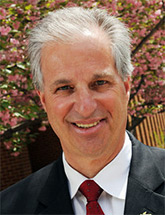CEHD's Dean Ginsberg Responds to NCTQ Review
June 18, 2013
Mark R. Ginsberg, dean of the College of Education and Human Development at George Mason University, offered a response to the June 18 release of the NCTQ Teacher Prep Review.

Mark R. Ginsberg
The review is a rating of teacher education programs in the U.S. conducted by the National Council on Teacher Quality in collaboration with U.S. News & World Report. In response to the report's release, Dean Ginsberg affirmed the College of Education and Human Development's (CEHD) "pride in its reputation for excellence in the preparation of teachers, school leaders, and other professionals working in our nation’s schools.”
Research consistently demonstrates that teachers are key to high performing schools. Public schools in the Northern Virginia region, where the university is located, are consistently viewed as among the highest performing in the United States. It is estimated that nearly one-third of the teachers and nearly one-half of administrators and other teacher leaders in the area are “Mason connected.”
Dean Ginsberg commented that the college shares NCTQ’s perspective about the importance of highly effective teachers working in the nation’s classrooms. The college declined to participate in the project as a matter of principle, however, because of significant questions and concerns about the standards and methods used in the study, which many have criticized as inadequate for assessing teacher education quality.
“Our choice to not participate was based on a strongly held belief that the evaluation of educator preparation must be based on a well-designed, systematic assessment model that has demonstrated validity and reliability,” said Ginsberg. “The decision by NCTQ to base its assessment on a review of course syllabi and other descriptive information neither provides sufficient validation of key process and outcome information nor provides evidence of sufficient breadth or depth for meaningful analyses.”
The College of Education and Human Development strongly supports valid and reliable assessments by third parties of its academic programs. CEHD is accredited by the National Council for Accreditation of Teacher Education (NCATE), the federal government’s recognized agency for the accreditation of educator preparation programs. Professional educator licensure programs are approved by the Virginia Department of Education, and 100 percent of CEHD’s teacher candidates have successfully passed pre-service examinations required for Virginia teacher licensure. In addition, CEHD was recently identified by U.S. News & World Report as one of the top 65 colleges of education in the United States, with the academic program in Special Education identified as a “top 20” program of study in this important field of professional preparation.
Ginsberg, who serves on the board of directors of the American Association of Colleges for Teacher Education (AACTE) and participates in the Council of Academic Deans from Research Education Institutions (CADREI), commented that “CEHD is committed to the preparation of highly capable and successful professional educators and to the learning and development of their students.” The college regularly assesses and evaluates its programs and works intentionally to improve the quality of teacher education through course evaluations, observations of teacher candidates in field placements, employer and graduate surveys, and assessments of PK-12 student learning, among other metrics. The dean affirmed “CEHD’s institutional commitment and responsibility to assess and evaluate the ‘currency and quality’ of all of our academic programs on an ongoing basis.”
About CEHD
George Mason University's College of Education and Human Development (CEHD) includes two schools, the Graduate School of Education, one of the largest in Virginia, and the School of Recreation, Health, and Tourism. CEHD offers a comprehensive range of degrees, courses, licensures, and professional development programs on campus, online, and on site. The college is distinguished by faculty who encourage new ways of thinking and pioneering research supported by more than $75 million in funding over the past five years.
For additional information:
- CEHD Communications: cehdnews@gmu.edu
- Graduate School of Education: gse.gmu.edu
Follow CEHD on Facebook at www.facebook.com/MasonCEHD or Twitter at @MasonCEHD.
